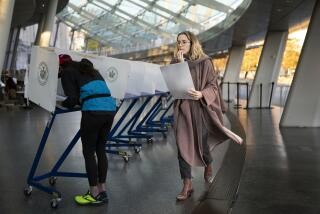Soviet Party May Lose Its Reserved Legislative Seats
- Share via
MOSCOW — Soviet lawmakers, rebelling against the Kremlin leadership, voted Tuesday to eliminate the Communist Party’s reserved seats in the country’s national assembly and other legislative bodies.
The move, a dramatic reflection of the rapid evolution of a new political system here, would force party leaders, including President Mikhail S. Gorbachev, to run in open, competitive elections.
After two days of heated debate, the Supreme Soviet, the country’s Parliament, voted overwhelmingly against a proposed constitutional amendment reserving seats in the Congress of People’s Deputies--the national assembly--and in lower-level councils for representatives of the Communist Party, the Communist Youth League, the country’s labor unions, veterans and other organizations.
What the lawmakers demanded was an electoral system based on the principle of “one person, one vote,” with the party and other organizations nominating candidates to compete against others from local groups.
In Soviet terms, the lawmakers were also affirming the principle of “all power to the soviets,” the country’s system of elected councils that is now being restored, and declaring that elected rather than appointed bodies must govern if basic political reforms are to succeed here.
Voting 254 to 85 against the reservation of one-third of the seats for special nominees, the deputies declared their independence from the party leadership, which had pushed hard to retain the reserved seats as its bedrock in all legislative organs.
At the same time, the lawmakers recognized that the country’s emerging political structures and shifting alliances could not be frozen prematurely in constitutional forms.
The package of constitutional amendments must still be approved by the present Congress of People’s Deputies, one-third of whose 2,250 members were elected from such “public organizations” as the party and labor unions. And any change will not take effect on a national level until the next parliamentary election, which is scheduled for 1994.
Nevertheless, the impact of the vote is likely to be immediate and large, with elections to city councils and other local governments planned for December and elections to republican legislatures scheduled from December into March. The deputies recommended that the country’s 15 constituent republics encompass the legislature’s action in drafting local election laws.
Hard-pressed to justify many of its policies and to explain the failure of perestroika-- Gorbachev’s program of political and economic restructuring--to improve life as much as promised, the party was already expecting substantial trouble in retaining control of many local governments. Among the regional trouble spots for the party are the Baltic republics of Estonia, Latvia and Lithuania, perhaps the southern republics of Armenia, Azerbaijan and Georgia, and the Ukraine, Byelorussia and Moldavia.
If the party and its allies were able to fill one-third of the seats in the Lithuanian Supreme Soviet, for example, the Lithuanian Reform Movement, known as Sajudis, might find itself fighting for a majority in the republic’s legislature--although it would win more than 80% of a popular plebiscite.
Tuesday’s vote was also a landmark in national politics.
Not only had the deputies defied the party leadership, even though many of them were chosen for the Supreme Soviet because of their presumed political docility, they had also laid the basis for a more independent political system.
“This was well beyond our expectations,” Sergei Stankevich, a liberal political scientist who represents a Moscow district, told reporters. The party’s nominees “will now have to win their seats in open electoral fights like everyone else.”
The move may not, in fact, diminish the Communist Party’s hold on the Congress of People’s Deputies or on the Supreme Soviet, a body of 542 deputies selected from within the congress, because party members won more than 85% of the seats in the national elections last March. But it will free even party members from the discipline that the party’s policy-making Central Committee and its powerful secretariat would like to exercise.
The system used in last spring’s parliamentary elections had given party members a greater role in constituting the Congress of People’s Deputies because many organizations had elected three, four or more representatives to the body.
Communist Party officials, starting with Anatoly I. Lukyanov, the country’s first vice president and a key Gorbachev aide, had pressed for the continuation of this system, calling it “proven” because of the March election.
“This is not just a question about elections, but of power,” Vitaly I. Vorotnikov, president of the Russian Federation, said, perhaps reflecting his own anxiety about a direct election. “It may lead to a . . . presidential form of rule, abolishing our collegial soviet system. Won’t these amendments turn the soviet system on its head?”
More to Read
Sign up for Essential California
The most important California stories and recommendations in your inbox every morning.
You may occasionally receive promotional content from the Los Angeles Times.













